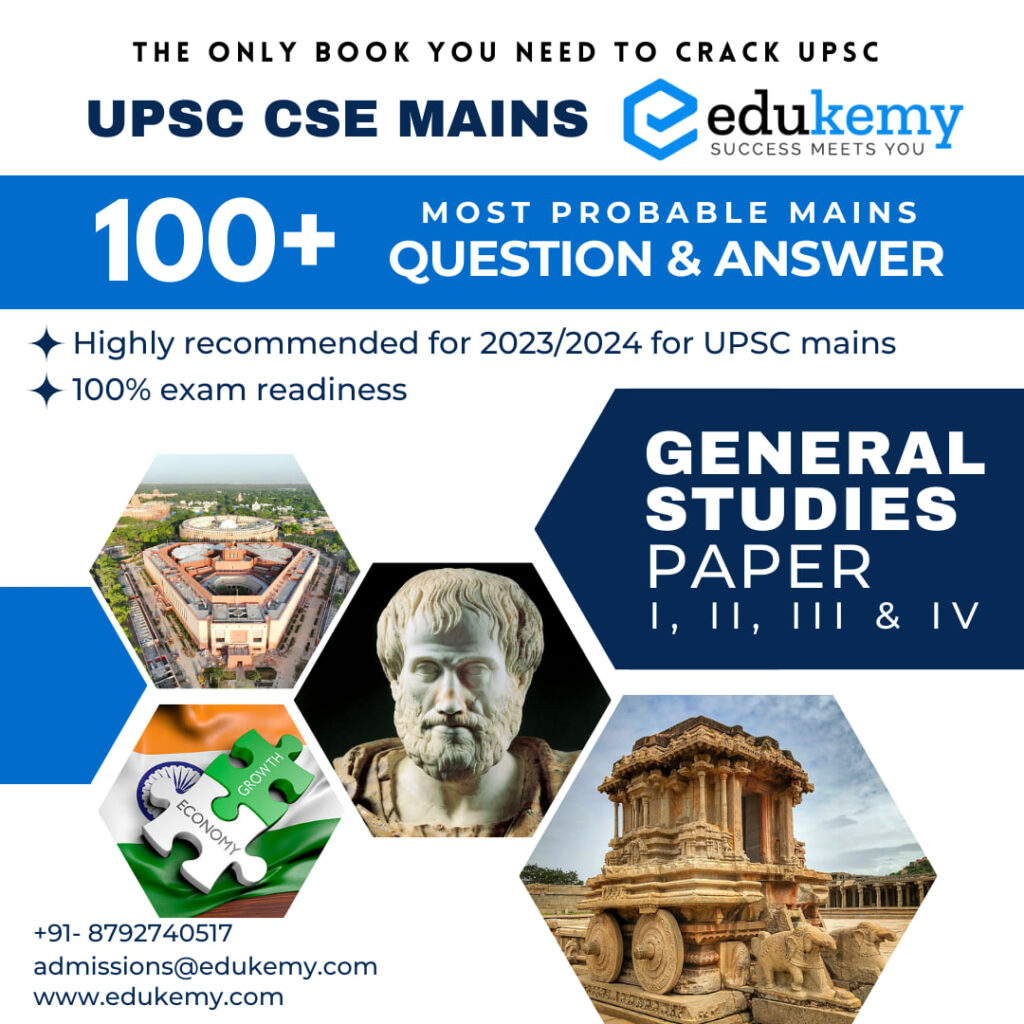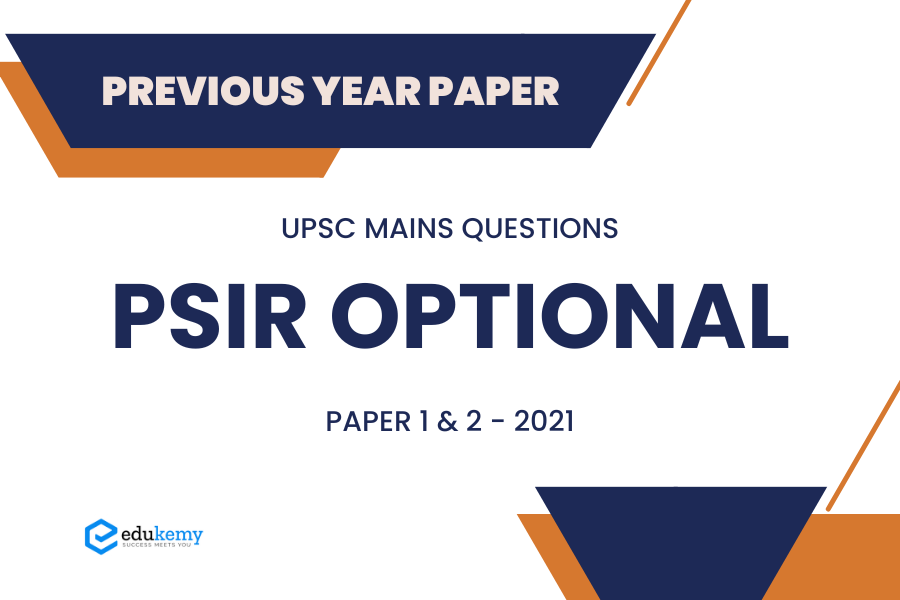

The Union Public Service Commission (UPSC) Main Examination is a pivotal stage in the journey of civil services aspirants in India. Among the various optional subjects offered, Political Science and International Relations (PSIR) stands out as a popular choice for its interdisciplinary nature and its relevance to the dynamics of governance and global affairs. Aspirants opting for PSIR delve into the intricate realms of political theory, comparative politics, and international relations. To prepare effectively for the PSIR optional paper in UPSC Mains, one invaluable resource is the analysis of previous year papers. These papers serve as a roadmap, offering insights into the exam pattern, question types, and the depth of knowledge required. A careful examination of these papers not only aids in understanding the evolving trends in UPSC examinations but also equips aspirants with the essential skills to navigate the challenges posed by the PSIR optional. In this context, delving into the previous year papers becomes an indispensable aspect of strategic preparation, fostering a comprehensive understanding of the subject and enhancing the prospects of success in the UPSC Main Examination.
Contents
- 1 Paper – 1
- 2 Paper-2
- 3 Frequently Asked Questions (FAQs)
- 3.1 FAQ: Are previous year question papers important for UPSC Mains PSIR optional preparation?
- 3.2 FAQ: How can I effectively use previous year question papers to enhance my UPSC Mains PSIR optional preparation?
- 3.3 FAQ: Can I solely rely on previous year question papers for PSIR optional preparation?
Paper – 1
Section-A
Q1. Comment on the following in about 150 words each: 10×5=50
- (a) Feminist critique of the State 10
- (b) Affirmative action 10
- (c) Equality of outcome as a political idea 10
- (d) Tools of legitimating of the State 10
- (e) J. S. Mill’s ideas on women’s suffrage 10
Q2.
- (a) How has Rawls enriched the idea of justice in liberalism? 20
- (b) Examine the importance of behavioral approach in political theory. What led to its decline? 15
- (c) Can there be universal conception of human rights? Give your arguments. 15
Q3.
- (a) Explain the Aristotelian view of politics. To what extent do you think it has contributed to the development of modern-day constitutional democracies? 20
- (b) “When a nation becomes devoid of arts and learning, it invites poverty.” (Sir Syed Ahmad Khan). In the light of this statement, assess the role of Sir Syed Ahmad Khan as a in as a reformer in modern India. 15
- (c) Political ideology is primarrily concerned with the allocation and utilization of Power.” Comment.
Q4.
- (a) Do you think that the buddhist traditions have lent greater ethical foundation to the ancient Indian political thought? Give your arguments. 20
- (b) Marx’s concept of ‘alienation’ is an essential part of the reality in capitalism. Explain. 15
- (c) Free and fair deliberation is key to the foundation of democracy.” Explain. 15
Section-B
Q5. Answer the following in about 150 words each : 10×5=50
- (a) “The Constitution of India is a product of a historical process, rich with constitutional antecedents.” Comment.
- (b) “The Constitution makers faced the great task of forging a common national identity in the face of unparalleled social and cultural diversity in India.” Comment.
- (c) Mention the founding principles that define India’s Constitution.
- (d) Analyze the Marxist perspective of the nature of Indian National Movement.
- (e) Underline the significance of the first constitutional amendment.
Q6.
- (a) “Constitutionally reconciling the Fundamental Rights with the Directive Principles of State Policy has led to frequent amendments of the Constitution and judicial interventions.” Comment.
- (b) The role of the President of India becomes more significant during a minority government and a coalition government. Explain.
- (c) Do you think that despite having significant limitations the Panchayati Raj institutions have strengthened the process of democratic decentralization? Give your views.
Q7.
- (a) “The Indian party system is shaped by a complex interaction of the country’s federal structure, electoral system and social cleavages.” Explain.
- (b) Do you think that there has been a gradual shift in the basis on which the demands for the creation of new States have been raised in different regions of India? Explain.
- (c) What explains India’s modest improvements in social development outcomes even as the rate of growth has accelerated since the initiation of economic reforms?
Q8.
- (a) The success of electoral democracy can partly be attributed to the status and role of the Election Commission of India.” Explain.
- (b) Examine the evolution of the jurisdiction of the Supreme Court of India as a Constitutional Court.
- (c) Explain how caste as a social category is also becoming a political category in the democratic politics of India.
Paper-2
SECTION-A
Q1. Answer the following in about 150 words each: 10×5=50
- (a) Discuss the political economy approach to the comparative analysis of politics. 10
- (b) “Political parties and pressure groups are sine qua non of democracy.” Comment. 10
- (c) “Marxist approach to the study of international relations has lost its relevance in the post-cold war era.” Comment.
- (d) What measures have been undertaken by the United Nations (for its reforms? 10
- (e) Discuss the five proposals made by India in the recent COP-26 conference held in Glasgow.
Q2.
- (a) “The post-colonial state was thought of an entity that stood outside and above society asan autonomous agency.” Explain.
- (b) Discuss the emergence of neo-realism and its basic tenets
- (c) What is ‘complex interdependence’? Discuss the role of transnational actors in the international system.
Q3.
- (a) Explain the impact of electoral systems and cleavages in shaping party systems with reference to developing countries.
- (b) What is globalisation? Why is there an intense debate about globalisation and its consequences?
- (c) Critically examine the decline of the United States of America as a hegemon and its implications for the changing international political order.
Q4.
- (a) The modernization thesis asserts that affluence breeds stable democracy. How do you explain the success of India being the world’s largest democracy as an exceptional case?
- (b) Explain the success of ASEAN as a regional organisation.
- (c) Explain India’s relations with the European Union in the context of Brexit. 15
Section-B
Q5. Answer the following in about 150 words each: 10×5=50
- (a) Discuss the strategic implications of India’s ‘Look East Policy’ transforming into ‘Act East Policy’.
- (b) Explain the philosophical foundations of India’s foreign policy.
- (c) Explain India’s position on the waiver of intellectual property rights on COVID-19 vaccines in WTO.
- (d) Write about the growing significance of QUAD
- (e) How does the recent takeover of Afghanistan by Taliban impact India’s strategic interests?
Q6.
- (a) “Non-alignment was little more than a rational strategy on the part of a materially weak India to maximize its interests with a bipolar distribution of global power.” Comment.
- (b) Examine the Geo-strategic points of contention in the bilateral relationship between India and China.
- (c) Write a brief analysis of the ethnic conflicts and cross-border migrations along India-Myanmar and India-Bangladesh borders.
Q7.
- (a) Why South Asia is considered as the world’s politically and economically least integrated region ? Explain.
- (d) How do the constituent states influence the foreign policy making process in India?
- (c) Examine the evolution of India’s role in the global nuclear order.
Q8.
- (a) “Relations between India and Russia are rooted in history mutual trust/and mutually beneficial cooperation.’ Discuss.
- (b) Discuss the “Sustainable Development Goals’ as set by the United Nations.
- (c) Identify the drivers of India’s new interest in Africa.
Frequently Asked Questions (FAQs)
FAQ: Are previous year question papers important for UPSC Mains PSIR optional preparation?
Answer: Yes, previous year question papers are extremely important for UPSC Mains PSIR optional preparation. They provide insight into the pattern, structure, and style of questions asked by the UPSC. Analyzing previous year papers helps candidates understand the weightage given to different topics, the depth of knowledge required, and the writing style expected by the examiners. Moreover, practicing with previous year papers allows candidates to assess their strengths and weaknesses and fine-tune their preparation accordingly.
FAQ: How can I effectively use previous year question papers to enhance my UPSC Mains PSIR optional preparation?
Answer: To make the most of previous year question papers, follow these steps:a. Topic Prioritization: Identify the recurring themes and topics that have been frequently asked in previous years. Focus more on these areas during your preparation.b. Time Management: Practice solving papers within the allocated time limit. This helps improve time management skills, ensuring that you can answer all questions within the stipulated time during the actual exam.c. Answer Writing Practice: Pay attention to the style and structure of answers that fetched higher marks. Practice writing answers in a concise and clear manner, adhering to the UPSC guidelines.d. Revision: Use previous year papers for revision. It helps in reinforcing your understanding of key concepts and ensures better retention of information.
FAQ: Can I solely rely on previous year question papers for PSIR optional preparation?
Answer: While previous year question papers are an invaluable resource, relying solely on them may not be sufficient. It’s essential to complement your preparation with standard textbooks, reference materials, and current affairs related to political science and international relations. Additionally, engaging in group discussions, joining test series, and seeking guidance from mentors can enhance your understanding and application of concepts. A comprehensive approach, combining various resources and strategies, will contribute to a well-rounded preparation for the UPSC Mains PSIR optional paper.
In case you still have your doubts, contact us on 9811333901.
For UPSC Prelims Resources, Click here
For Daily Updates and Study Material:
Join our Telegram Channel – Edukemy for IAS
- 1. Learn through Videos – here
- 2. Be Exam Ready by Practicing Daily MCQs – here
- 3. Daily Newsletter – Get all your Current Affairs Covered – here
- 4. Mains Answer Writing Practice – here
Visit our YouTube Channel – here

